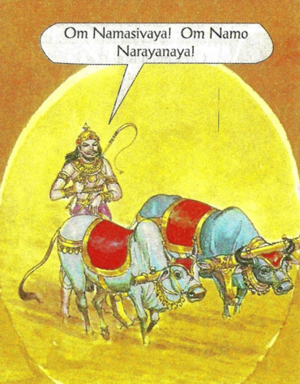Talk:Lunar Dynasty:Emperor Kuru: How Kurukṣetra got its name
By Vishal Agarwal
King Kuru of the Puru–Bhārata dynasty ruled a kingdom on the banks of Sarasvatī River, which flowed in northern India at the border of the Indian states of Haryana and Punjab. One day, his elderly prime minister asked permission to retire and settle down in Varanasi, on the banks of Gaṅgā. When the King asked for a reason, he replied, “Varanasi is a very holy city and Gaṅgā washes away our sins. It is said that Bhagavān Śiva grants Mokṣa to whosoever dies there. Therefore, please permit me to leave your kingdom.”
The King thought, “What can I do to make my kingdom as holy as Varanasi, so that my people do not have to travel this long distance for Mokṣa? After all, isn’t Sarasvatī River also a very holy river?” He called a meeting of his ministers and asked them for a solution. Many of them discouraged him from making any attempt in this regard. Some of them suggested that he should talk to Ṛṣis who lived in the forests on the banks of Kurukṣetra.
The King approached the Ṛṣis. They said to him, “Let us warn you that to make this place as holy as Varanasi is a very difficult task. You must pray to Śiva and Yama the Bhagavān of Death, to suggest a way.” But King Kuru was not dissuaded. He said, “Bhagīratha and his ancestors too worked very hard to get Gaṅgā from the heaven to this earth. I too am very determined to make my kingdom as holy as Varanasi.”
Hindu Dharm teaches us that after our death, we are reborn. We have also lived several lives before our present life. Every life has a mixture of happiness and sadness. We can be free of all sadness and sorrows only if we come out of this continuous cycle of birth–death–birth–death–birth–death… by becoming united with Bhagavān.
When this happens, we are not born again, and live in ever-lasting happiness with Bhagavān. Freedom from unhappiness, and from the continuous cycle of births and deaths is called Mokṣa, which means “liberation” or “freedom.”
Ṛṣis blessed him, and the King started worshipping and meditating on Śiva and Yama. They were pleased and granted a wish to King Kuru. The King said, “I request Bhagavān Śiva to loan me his bull Nandi, and Yama to loan me his buffalo. I will till the plains of my kingdom with these two divine animals, and this will surely make it very holy.”
Śiva and Yama loaned their mounts to King Kuru, who became a farmer and started tilling the land with great effort, while chanting, “Om Namaḥ Śivāya, Om Namo Nārāyaṇāya.”
After many years of effort, he tilled the entire land in his kingdom. Then he worshipped Bhagavān Viṣṇu to ask him what should be done next. Viṣṇu answered King Kuru’s prayers and said, “You have scratched off all evil from this land by ploughing it with Nandi and the buffalo of Yama. But you must also now plant the seeds of Dharm to make it holy. No one is as Dhārmic as you, King Kuru, because you have worked hard unselfishly for the sake of your own people. Will you agree to become the seed for sowing?”
King Kuru replied, “Bhagavān, what can make me happier than becoming the seed that will make the land of my people prosperous and holy?”
Bhagavān Viṣṇu then transformed the body of King Kuru into a heap of grain, and then sprinkled the seeds all over the land. When abundant crops had grown in the land, Viṣṇu then summoned the soul of King Kuru and granted him a wish. King Kuru’s soul replied, “Please make this land as holy as Varanasi, and let it hereafter be known as Kurukṣetra.” Bhagavān Viṣṇu granted his wishes.
Even today, People often visit Kurukṣetra for worship and prayer, and perform the funeral ceremonies of their dead ancestors in that area in the hope that Bhagavān will bless their souls. Some time later, Bhagavān Kṛṣṇa too appeared in Kurukṣetra and revealed to his friend Arjuna the Bhagavad Gītā, a holiest Śāstra.
King Kuru’s life teaches us how one should not hesitate to even give up every bit of our body in the service of others. By making a sacrifice without selfish desires, we can benefit others and earn the blessings of Bhagavān for ourselves.

